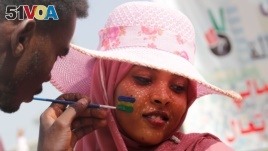01 May, 2019
Mervat al-Neel was one of the many women whose protests helped oust Sudan's long-time leader, Omar Hassan al-Bashir.
Now he is out of power, but Neel still wants to be heard. She is urging the Sudanese generals who replaced Bashir to give power to elected officials.
For many years, women had few rights under Sudan's Islamist government. If a man did not like a woman's clothing they could bring her to the police.
Now women want to have more control over the country.
That was Neel's message to the generals who are talking with her and others in the opposition movement.
Army officers ousted Bashir from power on April 11. One of the officers made the mistake of showing little respect to Neel when he spoke with her. So she hit back.
"You are here in a position of power because of us," she said.
Women took part in large protests that led to the fall of Sudan's president.
Neel is one of two women in a group negotiating with the army. She studied information technology and mathematics at Khartoum University. Neel said that she was firm in talks between the opposition and Transitional Military Council at the presidential palace.
Women suffered the most under Bashir's dictatorship. There were no women in his cabinet. Women could hold only 25 percent of the seats in parliament.
Al Rashid Saied is a spokesperson for the Sudanese Professionals Association, which organized the protests. Saied said the fact that women were demonstrating made them more successful.
Political activist Sara Mubarak is a member of the Communist Party. She worked for women's rights for years under Bashir. Now that he is gone, she is even braver.
Here to the end
Last year, people in Sudan protested about high prices. At that time Mubarak hid her political ideas when intelligence agents stopped and questioned her. Officials also detained her for a short time during the most recent unrest.
"This time I told the truth, that I was leading a protest," she said.

A Sudanese protester waits for a man to finish a painting of the Sudan's old national flag on her face
Mubarak added that she had to take 10 bus rides from her home town of Singa, south of Khartoum, to join a sit-in protest near the offices of Sudan's Ministry of Defense.
At the sit-in, Mubarak has slept on the street under a tent. A nearby poster showed Sudan's first woman member of parliament. Former Communist Party leader Fatima Ahmed Ibrahim was elected in 1965. The sign gives Mubarak hope that she will also be successful.
Hope for the future
Under Sudan's Islamic laws during the rule of Bashir, men were given rights to control all parts of women's lives - even their clothing. Bashir survived armed rebellions, economic crises and United States measures aimed at punishing his government. But today he is in a high-security prison in Khartoum. In the past, he sent thousands of political prisoners to that same prison.
Sudanese women were not only angry at the control Bashir had over their lives. In 2012, they beat on pots and other cookware in the street to protest economic conditions.
Accountant Sonia Seddik has a 23-year-old unemployed daughter who also studied financial record keeping. The security forces arrested her daughter and beat her for two days last December. Seddick hopes the changes will give her daughter a brighter future.
"We want a democratic Sudan in which women get their rights and have a larger role to play," she said.
Now, female protesters enjoy huge support. In the past, government officials called them bad names.
When women join the sit-in these days, cheering men call them "Kendaka" - the old Sudanese term for a female ruler or queen.
Both women and men have decided to continue demanding that the military give power to civilians. They are willing to wait for a short time.
People at the sit-in seemed happy earlier this week. A group of young musicians performed a Bob Marley song as politicians promise a new period of democracy. Many women removed the cloths covering their heads.
"We have to live freely, not like before," said 14-year-old Malak Magdi, standing next to her mother Amira.
"We have a lot of hope that in the near future we will have our freedom," said Amira, whose husband has taken part in the demonstrations.
I'm Jill Robbins.
Michael Georgy reported on this story for the Reuters news agency. Jill Robbins adapted it for Learning English. George Grow was the editor.
_________________________________________________________________
Words in This Story
sit-in – n. a strike or protest in which people sit or stay in a place and refuse to leave until they are given what they demand
tent – n. a temporary shelter made of cloth
accountant – n. a person whose job is to keep or inspect financial records
Do women take part in protests in your country? What are they trying to change? Write to us in the Comments Section.